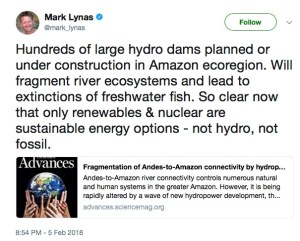In the first of two consecutive interviews with climate-change experts, authors, editors and readers of the Spanish magazine Quercus have a chat with Ken Caldeira, a global-ecology researcher at the Carnegie Institution for Science (Washington, USA). His responses attest that the climate system is complex, and that we need to be practical in dealing with the planet’s ongoing climate emergency.

SARS-Covid-19 is impacting the world. In our home country, Spain, scientists argue that (i) previous budget cuts in public health have weakened our capacity to tackle the pandemic (7), and (ii) the expert panels providing advice to our government should be independent of political agendas in their membership and decisions (8). Nevertheless, the Spanish national and regional governments’ data lack the periodicity, coherence, and detail to harness an effective medical response (9). Sometimes it feels as if politics partly operate by neglecting the science needed to tackle challenges such as the covid pandemic or climate change.
Having said that, even if a country has cultivated and invested in the best science possible, people have difficulties coming to terms with the idea that scientists work with probabilities of alternative scenarios. As much as there are different ways of managing a pandemic, scientists differ about how to mitigate the ecological, economic, and health impacts of a high-carbon society.
Thus, a more and more common approach is to make collective assessments (elicitations) by weighing different points of view across experts — for instance, to establish links between climate change and armed conflict (10) or to evaluate the role of nuclear energy as we transition to a low-carbon energy-production model (11). The overarching goal is to quantify consensus based on different (evidence-based) opinions.
The questions we here ask Ken Caldeira could well have different answers if asked of other experts. Still, as Ken points out, it is urgent that (of the many options available) we use the immense and certainty-proof knowledge we have already about climate change to take actions that work.
Interview done 23 January 2020
We italicise each question and the name of the person asking the question and cite one to three relevant publications per question. For expanding on Ken Caldeira’s views on climate change, see a sample of his public talks here and here and newspaper articles here and here.




